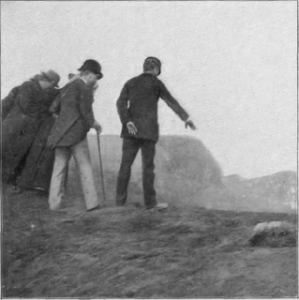The following email arrived in my Inbox this morning. I’m not sure what to make of it, but I thought I’d share it hear as it has some rather intriguing ideas in it.
Dear Wormwood,
You must think we senior tempters spend our heads in the burning sand. Of course we’re aware of the Internet – we’ve had our influence on it from the very beginning. There was a time when the humans expressed a concern about going to war based purely on the fact that their pathetic attempts to communicate with each other would fail at the dropping of the first hydrogen bomb. Old Slitgrubber realised that this was a fine opportunity for us to increase despair by prompting them with a means of improving their communications, and hence making them slightly less squeamish about war. Of course, it wasn’t the war we were interested in – it was the wondrous sense of fear and despair that such things bring about.
Of course, The Enemy was soon on the case – they are just SO bothersome – and managed to wrench some good out of the Internet, prompting it’s use by ‘normal’ humans who could use it to talk to each other, do business, send greetings – all sorts of nonsense. But, our Research Department was always on the case and they very soon realised that the Internet still provides a fine opportunity for soul-hunting. Indeed, it’s use as a campaigning tool for us has improved with every new generation of software. By Web 4.0 I’m sure it will be delivering souls by the Gigabyte!
Your proposals are, as always, dear nephew, of mixed value. Are you sure that some piece of human brain hasn’t got lodged up there with your own? They range from the blatantly obvious to the abjectly stupid, with fleeting glimpses of items of possible use. But, we are here to teach and you are here to be taught; I suppose I’d better get on with it. It’s a big subject; there are many obvious opportunities for temptation out there that can be used in less than obvious ways for our end, but I’ll investigate those at a later date.
Today I’ll give you a technique of achieving a ‘quick hit’ on your candidate, something that’s useful for …ahem….’grabbing low hanging fruit’. See how I’m getting all the jargon right? Who says you can’t teach an old devil new tricks?
The Internet annihilates time. Wormwood, to you and I time is something that we don’t take too much notice of. For the humans it’s critical – many of them run around claiming they don’t have enough time to do this, that and the other whilst wasting what time they do have on activities that don’t benefit them at all – in fact, in many cases, they don’t even get pleasure from what they spend the time doing! The Internet has greatly helped us here. Email, Immediate Messaging, Facebook and even Text Messaging has allowed us to short circuit their thinking by convincing them that whatever pops up in their electronic in boxes is actually important, rather than just immediate.
You might be aware of the work of that objectionable human Jung. Why he couldn’t have just kept spouting the useful materialism of Freud I have no idea, but The Enemy clearly inspired him on more than one occasion and he came up with the following observation – it’s almost as if he was reading the research Department’s report on technological advances and how we can use them:
“[Most advances] are deceptive sweetenings of existence, like speedier communications, which unpleasantly accelerate the tempo of life and leave us with less time than ever before. Omnis festinatio ex parte diaboli est – all haste is of the Devil”
Fortunately for us, the humans don’t take too much notice of such comments and we can still con them in to thinking that all these advances give them time. What they actually do is eat up their time, encourage them to focus on things that are immediate or that give momentary pleasures, encourage them to forget what’s truly important and reply to all these messages quickly and without deep thought – and hopefully in the process cause offence and irritation to the senders of some of the messages by their thoughtless response. If we’re really lucky we can encourage a good run of selfishness in the souls we’re interested in, encouraging them to forget activities such as prayer and contemplation – all by the simple expedient of providing a new game to play online.
So, Wormwood – see what you can do with your case in terms of getting them to really take on board as many forms of new technology as possible, and, more importantly, encourage them to take their pleasure in the trivial, accelerate the tempo of their lives so that they don’t know whether they’re coming or going. And then we can really get to work…
The mail ended here. I’m going to keep my eye on my inbox to see whether I receive any further missives from Screwtape, who(what??)ever he is.

 Yesterday’s exploration of ‘What would George say?’ led me to following up a few points of research and whilst browsing around I came across this quote of Orwell’s:
Yesterday’s exploration of ‘What would George say?’ led me to following up a few points of research and whilst browsing around I came across this quote of Orwell’s: